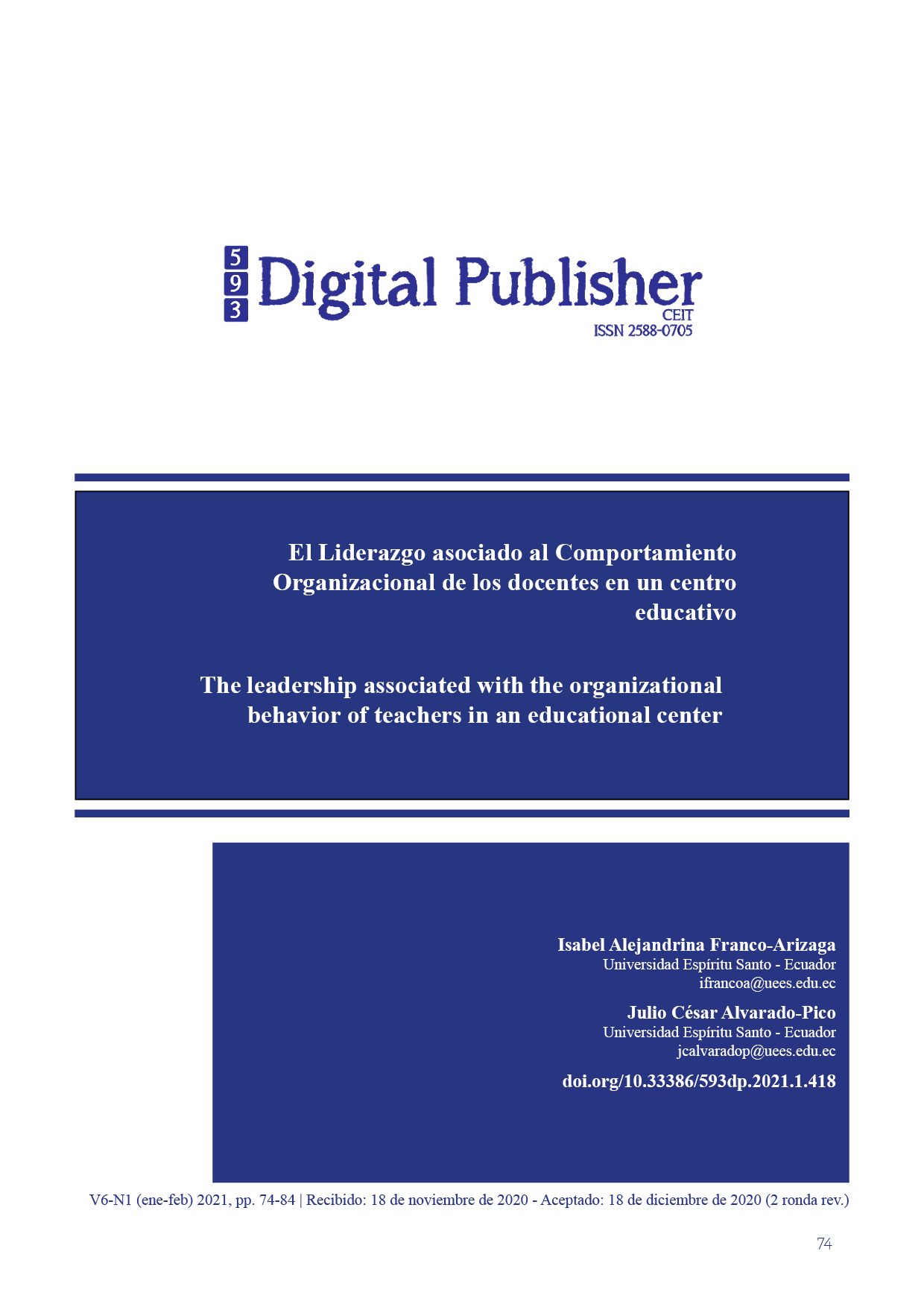The leadership associated with the organizational behavior of teachers in an educational center
Main Article Content
Abstract
In Educational Institutions it is essential that their collaborators feel committed and empowered by the well-being of the establishment, where the role of the leader plays a transcendental role, since the leadership applied in the direction of the staff must be reflected in an organizational behavior that complies with the objectives proposed by the institution interested in providing an Educational service according to the expectations of the community. This research aims to generate a Transformational Leadership model as a strategy to promote Organizational Behavior in the Educational Institution to remedy the problem faced by an Educational leader when his leadership is not defined and therefore the activities of the establishment are not correctly directed . Methodologically, a descriptive research was developed with a mixed approach integrating qualitative research, to understand the reality of the campus under study, from the point of view of managers and teachers. The scope of this research is exploratory since the two variables analyzed focus on the type of leadership applied and how it influences organizational behavior. To provide a satisfactory answer in this educational scenario and that its application has the expected results, the structural systemic method, inductive-deductive method and scientific modeling were used within the scientific methodology and as empirical methods, simple observation, the method of scales and expert judgment. As an instrument, a questionnaire with a Likert scale was used to determine the degree of commitment of teachers and the following indicators were considered: Commitment, attitude, proactivity, work performance, initiative and companionship, and the interview. The contributions contained in this research are intended to provide the leader with a leadership model for a successful management of the Educational Center and its influence on the personnel it directs.
Downloads
Article Details

This work is licensed under a Creative Commons Attribution-NonCommercial-ShareAlike 4.0 International License.
1. Derechos de autor
Las obras que se publican en 593 Digital Publisher CEIT están sujetas a los siguientes términos:
1.1. 593 Digital Publisher CEIT, conserva los derechos patrimoniales (copyright) de las obras publicadas, favorece y permite la reutilización de las mismas bajo la licencia Licencia Creative Commons 4.0 de Reconocimiento-NoComercial-CompartirIgual 4.0, por lo cual se pueden copiar, usar, difundir, transmitir y exponer públicamente, siempre que:
1.1.a. Se cite la autoría y fuente original de su publicación (revista, editorial, URL).
1.1.b. No se usen para fines comerciales u onerosos.
1.1.c. Se mencione la existencia y especificaciones de esta licencia de uso.
References
Almas, S., Chacón-Fuertes, F., & Pérez-Muñoz, A. (2020). Direct and Indirect Effects of Transformational Leadership on Volunteers’ Intention to Remain at Non-profit Organizations. PsychosocialIntervention, 29(3), 125-132.
Álvarez-Silva, L. A. (Diciembre de 2018). Reseña del «Comportamiento Organizacional. Administración de personas y organizaciones». Podium(34), 89-92.
Barnard, C. I. (01 de enero de 1971). The Fuctions on the Executive. Obtenido de Harvard University Press: https://www.hup.harvard.edu/catalog.php?isbn=9780674328037
Caro-Valverde, M. T. (01 de enero de 2018). La comunicaciónargumentativaen laSociedad del Conocimiento, clave del liderazgo distribuidopara un cambio educativodesde el desarrollo profesional. Revista de Educación a Distancia, 56(8), 01-30.
Chiavenato, I. (2009). Comportamiento Organizacional. La dinámico del éxito en las organizaciones (2da ed.). México: McGrawHill Educacion.
Consuelo-Bravo, C., Sarmentero-Bon, I., Gómez-Figueroa, O., & Falcón, O. (enero-abril de 2018). Procedimiento para el estudio del Comportamiento Organizacional. Ingeniería Industrial, XXXIV(1), 92-100.
Del Salto-Zurita, V. A., Fernández-Lara, A. I., & Pachar-Puga, M. d. (05 de 01 de 2019). El liderazgo educativo y el desempeño docente: un estudio etnometodologico de la realidad ecuatoriana. Ciencia Digital, 3(1), 257-271.
Escandón-Barbosa, D. M., & Hurtado-Ayala, A. (abril-junio de 2016). Influencia de los Estilos de Liderazgo en el desempeño de las empresas. Estudios Gerenciales, 32(139), 137-145.
Ferrer-Dávalos, R. M. (2015). La influencia del factor humano, el liderazgo y la cultura de las organizaciones en los procesos de implementación y gestión del cambio organizacional. Rev. Int. Investig. Cienc. Soc., 11(1), 102-114.
García-Solarte, M. (2015). Formulación de un modelo de liderazgo desde las teorías organizacionales. Scielo, 11(1), 60-79.
Génesi, M., Romero, N., & Tinedo, Y. (2011). Comportamiento Organizacional del Talento humano en la Instituciones Educativas. Negotium, 18(7), 102-128.
Hermosilla, D., Amutio, A., da Costa, S., & Páez, D. (2016). Obtenido de Journal of Work and Organizational Psychology: http://www.elsevier.es
Jaramillo-Benavides, V. E., & Fierro-Ulloa, I. J. (diciembre de 2016). Análisis del Liderazgo Transformacional y su Importancia en los tiempos de crisis. Podium(30), 97-119.
Madero-Gómez, S. M., & Olivas-Luján, M. R. (2016). Análisis de los factores del comportamiento organizacional en jóvenes que están iniciando su carrera laboral. Estudios Gerenciales(32), 51-59.
Mita, E., Camacho, G., Corso, G., Escalier, S., & Reynaga, C. (junio de 2015). Influencia del liderazgo transformacional en el clima Organizacional de las Carreras de la Universidad San Francisco Xavier de Chuquisaca. Ciencia, Tecnología e Innovación, 10(11), 623-634.
Molina-Sabando, L. A., Briones-Véliz, I. B., & Arteaga-Coello, H. S. (octubre de 2016). El comportamiento organizacional y su importancia para la administración de empresas. Dominio de las Ciencias, 2(4), 498-510.
Morejón, M. (30 de octubre de 2018). Comportamiento organizacional: Análisis a partir de su aplicación en la Administración Pública. Enfoques, 16(29), 17.
Pérez-Cepeda, M. (enero-marzo de 2016). La Conducta Organizacional ¿Es necesario instaurar el código de conducta organizacional? Revista Empresarial, ICE-FEE-ECSG, 10(1), 21-26.
Pérez-Ortega, G., Jiménez -Valdez, G. L., & Romo -Morales, G. (enero-junio de 2017). Caracterización del Liderazgo Transformacional de los directivos de instituciones de educación superior. Caso de estdio en una universidad del departamento de Antioquia. Entramado, 13(1), 48-61.
Robbins, S. P., & Judge, T. A. (2017). Comportamiento Organizacional (17 ed.). Mexico: Pearson Educación.
Salvador-Moreno, J. E. (30 de 12 de 2019). Compromiso Organizacional y Riesgos Psicosociales. San Gregorio, 1(35), 157-172.
Sardon-Ari, D. L. (septiembre de 2017). Liderazgo transformacional y gestión Escolar en instituciones educativas. Rev. Investg. Altoandin, 19(3), 295-304.
Smit, B. (1 de julio de 2018). Expanding Educational Leadership Theories through Qualitative Relational Methodologies. Revista Internacional de Investigación en Educación, 11(22), 75-86.
Vera-Salas, L., & Gálvez, P. (octubre-diciembre de 2016). Comportamiento Organizacional Ciudadano o Sídrome del buen soldado. Revista Empresarial, ICE-FEE-UCSG, 10(4), 44-50.



